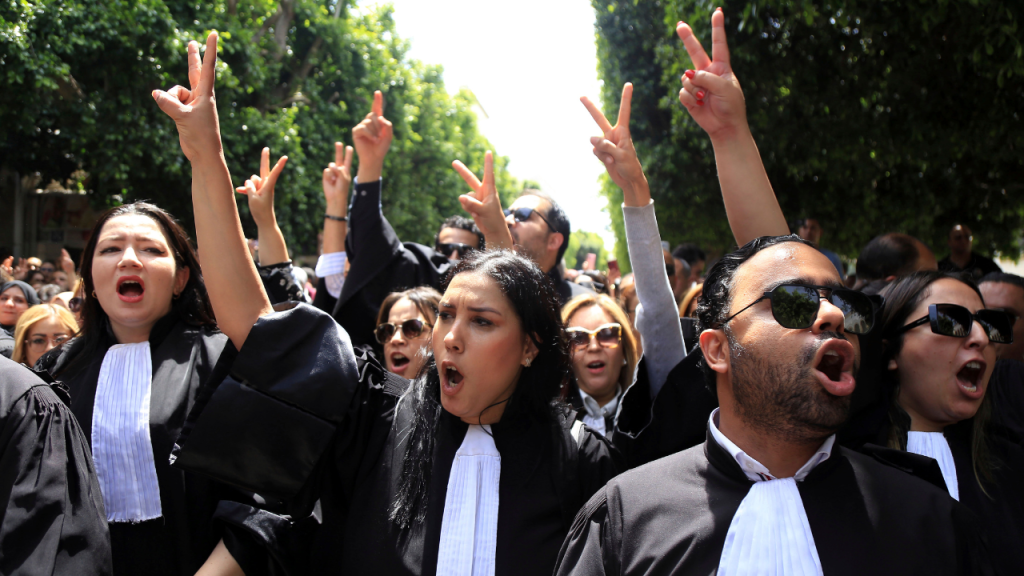Lawyers in Tunisia recently protested against a series of arrests that have occurred within the country. The demonstrations were sparked after two lawyers were arrested, one forcibly removed from the bar association headquarters and the other hospitalized due to injuries sustained during apprehension by security forces. Both lawyers were charged with violating a cybercrime statute that outlaws fake news, a law increasingly used to target critics. The National Bar Association responded by calling for nationwide strikes and organizing a “day of anger” with protests and strikes to protest against what they see as unjust arrests.
The protests in Tunisia have been part of ongoing civil rights demonstrations since President Kais Saied’s consolidation of power in July 2021, following the freezing of parliament and the dismissal of top ministers. This recent round of arrests, which includes lawyers, journalists, and prominent activists, signal a new stage in Saied’s crackdown on dissent. The Bar Association has condemned the arrests, with President Hatem Mziou demanding an apology from authorities for the “enormous blunders” committed. Mziou emphasized that they are fighting for a democratic climate and respect for freedoms, warning of further action if authorities do not change course.
During the protests, the Bar Association, along with activists and civil society groups, gathered in front of the capital’s courthouse, chanting for freedom and voicing their opposition to what they perceive as a growing police state in Tunisia. The association highlighted the case of Mehdi Zaghrouba, one of the arrested lawyers, who they claim was tortured and lost consciousness after being apprehended, resulting in visible injuries throughout his body. The government, however, denied allegations of torture and stated that the arrest was conducted legally and without issue. Interior Ministry spokesperson Faker Bouzghaya dismissed claims of torture as an attempt to avoid justice, in line with the government’s stance on the matter.
The increased arrests and crackdown on dissent in Tunisia have drawn international attention and condemnation. The actions of the authorities are seen as a threat to freedom of speech and democracy within the country. The protests by lawyers and civil society groups highlight the ongoing struggle for civil rights and liberties in Tunisia, an issue that has been exacerbated by recent events. While protests and strikes continue in response to the arrests, the government’s response has been to deny allegations of wrongdoing and maintain that the arrests were carried out in accordance with the law.
The protests in Tunisia have brought to light concerns about the erosion of democratic values and freedoms within the country. The actions of President Kais Saied and his government have been met with criticism and condemnation from both domestic and international observers. The arrests of lawyers, journalists, and activists have intensified calls for accountability and respect for civil rights. The demonstrations by the National Bar Association and other civil society groups serve as a reminder of the ongoing struggle for democracy and freedom in Tunisia, despite the challenges and obstacles faced in recent months.
As protests and strikes continue in Tunisia, the situation remains tense as the government and civil society groups remain at odds over the recent arrests. The calls for accountability and respect for civil rights persist, with demands for justice and a return to democratic norms. The actions of the Tunisian government, particularly in relation to the arrests of lawyers and activists, have raised concerns about the state of democracy and freedom in the country. The international community is closely monitoring the situation, with the hope that Tunisia can navigate these challenges and emerge stronger in its commitment to democracy and human rights.













